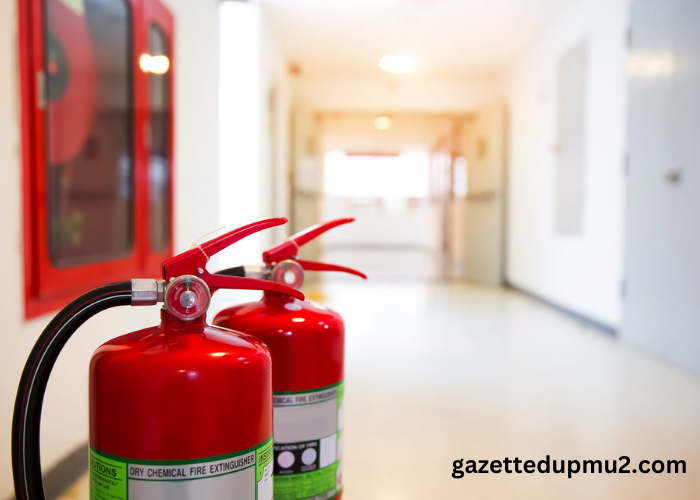Fire safety management is a crucial aspect of operating commercial facilities. Ensuring the safety of employees, customers, and property from fire hazards is not only a legal obligation but also a moral responsibility.
This guide aims to provide you with comprehensive insights into effective fire safety management strategies that can help you protect your commercial facility.
Understanding Fire Risks in Commercial Facilities
Every commercial facility has unique fire risks. Factors such as the type of business, materials stored, and building layout can significantly affect fire hazards. Here are some common risks to consider:
Combustible Materials
Many commercial facilities store combustible materials, such as paper, wood, chemicals, and plastics. These materials can ignite easily and contribute to the spread of fire.
Electrical Systems
Faulty wiring, overloaded circuits, and malfunctioning equipment can lead to electrical fires. Regular inspections and maintenance of electrical systems are crucial to minimizing this risk.
Cooking Equipment
In facilities with kitchens, cooking equipment poses a significant fire hazard. Grease buildup and unattended cooking can result in fires if not managed properly.
Heating Systems
Heating systems, including furnaces and space heaters, can be a source of fire risk if not maintained correctly. Regular servicing is essential for safe operation.
Human Error
Most fires in commercial facilities are caused by human error. Training employees on fire safety protocols and procedures is vital for prevention.
Fire Prevention Measures
After finding fire risks, the next step is to prevent them. These actions can significantly reduce the likelihood of a fire breaking out.
Install Fire Detection Systems
Fire alarms and smoke detectors are essential for early fire detection. Ensure they are regularly tested and maintained for optimal performance. Also, consider installing a sprinkler system in your facility for added protection.
Proper Storage and Housekeeping
Proper storage of flammable materials is crucial to fire prevention. Keep all hazardous materials stored in designated areas that are clearly labeled. Avoid clutter. Follow housekeeping practices to reduce fire hazards.
Maintain Electrical Systems
Regularly inspect electrical systems for any signs of wear and tear. Avoid overloading circuits and ensure that all electrical equipment is properly maintained. Utilize surge protectors and avoid using extension cords for long-term use.
Conduct a Fire Risk Assessment
A thorough fire risk assessment helps identify potential hazards. Consider factors like flammable materials, electrical systems, and the presence of heat sources. This assessment should be conducted regularly to keep safety measures up to date.
Know Local Fire Codes
Familiarize yourself with local fire codes and regulations. These codes guide you in preventing fires and ensuring safety in your facility. Regulatory compliance not only protects lives but also helps avoid legal issues. Ensure that your facility meets all requirements and make sure to update any necessary changes.
Employee Training and Preparedness
A well-prepared staff can make a significant difference in fire safety management. Regular training and drills ensure that employees know what to do in case of a fire.
Conduct Fire Safety Training
Provide comprehensive fire safety training for all employees. Topics should include: how to use fire extinguishers, evacuation procedures, and emergency contacts. Training should be conducted regularly to refresh employees’ knowledge.
Install Fire Alarms and Smoke Detectors
Fire alarms and smoke detectors are essential for early detection of fires. Make sure these devices are installed in all necessary areas, such as offices, break rooms, and hallways. Regularly test and replace batteries if needed.
Create a Fire Escape Plan
In the event of a fire, it’s crucial to have a clear escape plan in place.
The plan must include:
- Designated exit routes.
- Emergency rendezvous points.
- Procedures to assist those with disabilities or special needs.
Regularly Inspect Fire Exits
Ensure that all fire exits are clearly marked and easily accessible at all times. Conduct regular inspections to make sure there are no obstructions blocking the exits.
Keep a Fire Extinguisher on Hand
Fire extinguishers are a must-have in any workplace. Make sure there is at least one easily accessible extinguisher on each floor of the building. Train employees on how to use them properly and conduct regular checks to ensure they are working correctly.
Hold Regular Fire Drills
Schedule fire drills to practice evacuation procedures. Ensure employees know the nearest exits and assembly points. These drills help everyone respond quickly and calmly in an emergency.
Emergency Response Plan
An emergency response plan is critical for fire safety in commercial buildings. This plan outlines the steps to take in case of a fire and ensures everyone knows their roles.
Develop a Fire Emergency Plan
Make a detailed fire plan. It must include evacuation routes, assembly points, and emergency contacts. Distribute this plan to all employees and post it in common areas.
Coordinate with Local Fire Departments
Establish communication with local fire departments. They can provide insights into your facility’s specific risks. They can also help during emergencies. Inform them of any changes to your building layout or operations that may affect their response.
Additional Safety Measures
Besides prevention and emergency preparedness, commercial facilities can enhance fire safety. They can do this by installing fire alarms, sprinklers, and smoke detectors. Regularly test these systems to ensure proper functioning.
Install Fire Suppression Systems
Consider investing in fire suppression systems, like sprinklers or foam. They can quickly extinguish fires before they spread. It is essential to regularly inspect and maintain these systems to ensure their effectiveness.
Seek Professional Help
In addition to local authorities, consider a fire safety consultant. They can assess your facility’s risks and recommend fire safety improvements.
Hire a Fire Watch Guard
During high-risk periods, or if your facility is under repair, it may be wise to hire a fire watch guard in Jacksonville, FL. They track the premises for fire hazards and enforce safety protocols. This added layer of protection can give you peace of mind and protect your business from potential losses.
Prioritizing Fire Safety Management for Commercial Facilities
Fire safety management in commercial facilities is crucial for protecting lives and property. A fire safety plan can greatly reduce fire risks. It must include risk assessments, prevention strategies, training, and emergency response.
A solid plan is essential for compliance, safety, and continuity. Consider hiring a fire watch guard to keep your facility safe. Prioritizing fire safety protects employees and supports your business’s long-term success.
If you would like to read more articles like this, check out the rest of our website.





